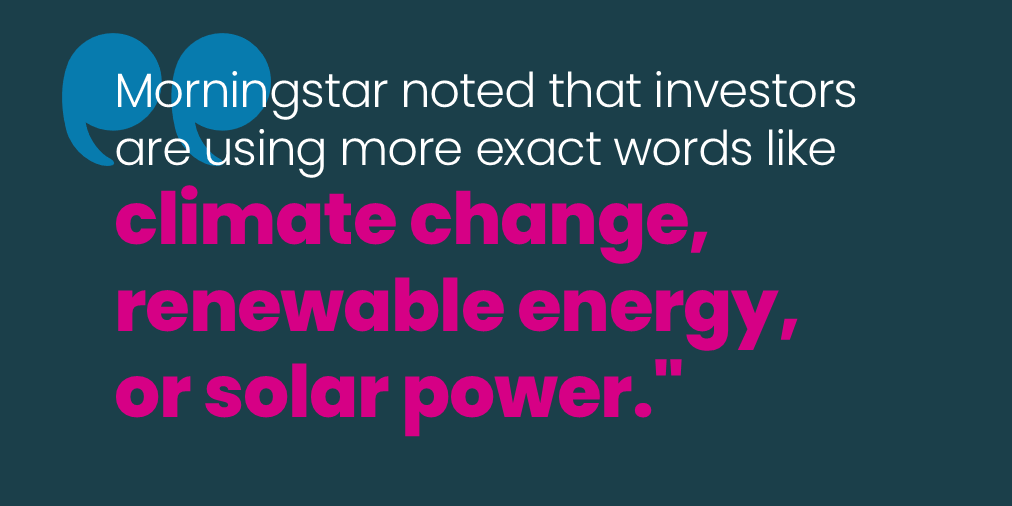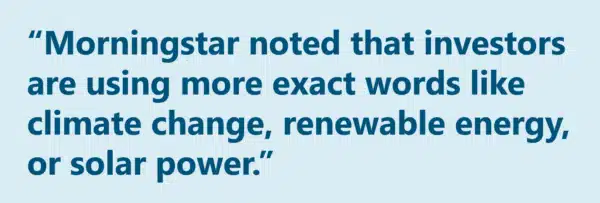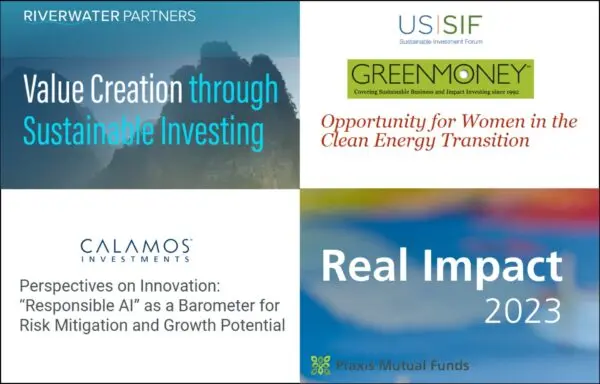
Be more specific in describing your sustainable investment strategies
Investor interest in sustainable and impact investing remains high. A 2024 study from Morgan Stanley indicated that more than half of individual investors plan to increase their allocations to sustainable investments in the next year. Like consumers who choose to buy products that use recycled materials or avoid products that are produced with child labor, many investors would like to see their investment dollars invested in a way that aligns with their values or avoids contributing to a warming planet.
A recent study from Morningstar highlights the challenge, especially for financial advisors, in communicating with investors about sustainable investment products. Advisors want to prioritize their clients’ financial goals based on their time horizon and risk tolerance—already a significant undertaking. Adding priorities to consider ESG (environmental, social and governance) factors can feel overwhelming. And the truth is, Morningstar’s research found that’s not even how investors themselves seem to be thinking about these investments.
 Morningstar gathered and evaluated nearly 27,000 posts and comments related to ESG from finance-related communitieson Reddit, specifically those focused on personal finance and investing. Using an AI natural language processing approach to select common terms and evaluate the sentiment of the posts, Morningstar noted that investors aren’t using the term ESG. They are using more exact words like climate change, renewable energy or solar power. Furthermore, while the industry uses terms like ESG risk or ESG impact, these terms were not used by investors online.
Morningstar gathered and evaluated nearly 27,000 posts and comments related to ESG from finance-related communitieson Reddit, specifically those focused on personal finance and investing. Using an AI natural language processing approach to select common terms and evaluate the sentiment of the posts, Morningstar noted that investors aren’t using the term ESG. They are using more exact words like climate change, renewable energy or solar power. Furthermore, while the industry uses terms like ESG risk or ESG impact, these terms were not used by investors online.
Morningstar concluded that ESG is part of the puzzle, but not the whole puzzle. And the conversations were not as polarized as discussions around ESG have been over the last few years.
The study’s author, Danielle Labotka, wrote, “ESG has it all, and for financial advisors, that can be a problem. Environmental, social, and governance investing has become a widely discussed subject in the financial industry. But new Morningstar research finds that for investors, ‘ESG’ isn’t really a thing. Instead, investors prefer to use more-exact terms related to the topic, such as ‘climate change.’ This points to the importance of stepping away from such industry jargon when talking to clients.”
Some practical suggestions for connecting with investors
There are lessons here for marketing and communications professionals:
Focus on the investment opportunity. Communicate in a way that isn’t solely about your values but is also about your process to find great investments. Investors want to find ways to profit from the energy transition, for example. They expect these companies to perform well. Identifying and describing the investment frameworks and processes your team uses to find top-performing companies is a must.
Identify descriptive terms that are meaningful to investors. Work with your digital marketing team to identify the key terms investors are using. To the extent that they represent your investment approach, incorporate these meaningful terms into market commentary, website descriptions, fact sheets and your thought leadership pieces. This will improve the chances that like-minded investors find you.
Keep in mind there is no one size fits all. Each individual seeking to build a sustainable portfolio is likely to prioritize different values. Identifying your niches—whether you are a faith-based investor, a stock picker focused on finding safer uses of AI and social media, or a climate-focused green bond investor—is a first step. There are as many approaches to sustainable investing as there are to traditional investing. Clearly define what makes your approach different.
Realize that terms like ESG are not always meaningful for investors. Advisors and some asset managers embraced the term in an attempt to simplify or even quantify what they were doing. By identifying environmental, social or governance factors, asset managers thought they were clearly describing an investment discipline and sharing meaningful data. But by trying to simplify the process with a catch-all term like ESG, useful and meaningful differentiating information that investors actually care about is lost. Instead, describe your approach and thought process in greater detail with real company examples to demonstrate how and why you believe these investments can make money and make a difference.
Instead of running away from ESG, recognize that there is still robust interest in finding investments that can profit from a more sustainable future. Using words that more specifically describe the investment opportunity instead of broader, less meaningful terms, can help you find and appeal to interested clients.
Thinking about getting the word out about your sustainable investment strategies? We can help—send us a note.
Subscribe.
Receive the latest news and insights from Lowe Group.
